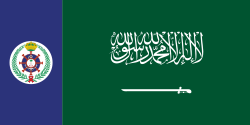This is an old revision of this page, as edited by 211.30.156.215 (talk) at 03:14, 15 October 2007. The present address (URL) is a permanent link to this revision, which may differ significantly from the current revision.
Revision as of 03:14, 15 October 2007 by 211.30.156.215 (talk)(diff) ← Previous revision | Latest revision (diff) | Newer revision → (diff)



 State and military flag and ensign (obverse). Hoist (flagpole side) is to the right. Flag ratio: 2:3
State and military flag and ensign (obverse). Hoist (flagpole side) is to the right. Flag ratio: 2:3


 Civil ensign (obverse). Hoist (flagpole side) is to the right. Flag ratio: 2:3
Civil ensign (obverse). Hoist (flagpole side) is to the right. Flag ratio: 2:3

 Naval Ensign of Saudi Arabia (obverse). Hoist (flagpole side) is to the right. Flag ratio: 12:25
Naval Ensign of Saudi Arabia (obverse). Hoist (flagpole side) is to the right. Flag ratio: 12:25
The flag of Saudi Arabia is the flag used by the government of Saudi Arabia since March 15, 1973. It is a green flag featuring in white an Arabic inscription and a sword.
The script on the flag is written in the Thuluth script. It is the shahada or Islamic declaration of faith:
- لا إله إلا الله محمد رسول الله
- la ilaha ill allah muhammadun rasul allah
- "There is no god but Allah, and Muhammad is his Messenger"
The sword, symbolising the victories of Ibn Saud, is underneath the inscription.
Green flags bearing this or other Arabic scripts are frequently seen in Islam and should not be confused with the Saudi national flag. These other flags normally do not bear the sword symbol.
The flag is manufactured with differing obverse and reverse sides, to ensure the shahada reads correctly, from right to left, from either side. The sword points from hoist to fly on both sides. The flag is sinister hoisted, meaning that the obverse side (front) has the hoist side (flagpole side) to the right.
Use
Because the shahada is considered holy the flag is not normally used on T-shirts or other items. Saudi Arabia protested against its inclusion on a planned football to be issued by FIFA, bearing all the flags of the participants of the 2002 Football World Cup. Saudi officials said that kicking the creed with the foot was completely unacceptable. Similarly, an attempt by the US military to win favour with children of the Prost region of Afghanistan by distributing footballs adorned with flags, including that of Saudi Arabia, ended in demonstrations .
Similarly, the flag is never lowered to half-mast as a sign of mourning.
The normal flag cannot be hoisted vertically according to Saudi legislation. Special vertical flags are manufactured where both the inscription (the creed) and the emblem (the sword) are rotated, although this is rare as most Arab countries lack the tradition of hoisting flags vertically.
History
A green flag with the shahada has been connected with the Wahhabi reformist movement since the 18th century. This movement was associated with the Al Saud family's rise to power, and when Abdulaziz ibn Abdulrahman as-Saud became King of the Nejd in 1902, he added a sword to this flag. The flag has been used since then, although prior to the official adoption on the March 15 1973, variants with two swords and/or a white vertical stripe at the hoist were also seen with the light green and white Islamic color design scheme.
Past Flags
The precursor states to Saudi Arabia were Nejd and Hejaz. The state flag of Nejd followed today's Saudi flag pattern very closely. The state of Hijaz followed the patterns seen in countries like Western Sahara and Sudan. A possible solution to the FIFA flag controversy could had been to use Hejaz's last flag or one of Nejd's from the early 20th century. From 1744 a crescent was present. From 1902 until 1921 a different Arabic inscription was used.
Other flags
The civil ensign, for use by merchant vessels at sea, is a green flag with the state flag in the canton with a white border. The royal standard is the state flag with the palm tree and swords in the canton.
References
- Leithead, Alastair (2007-08-26). "'Blasphemous' balls anger Afghans". BBC News Online. Retrieved 2007-08-26.
{{cite news}}: Check date values in:|date=(help)
External links
| National flags and coats of arms | |
|---|---|
| National flags | |
| National coats of arms | |